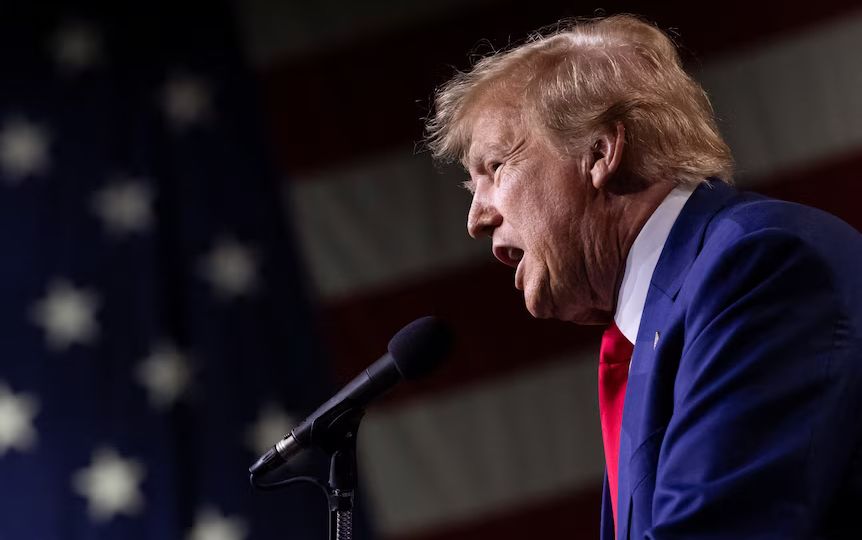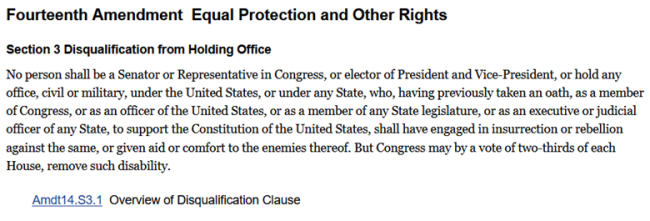
Colorado Supreme Court Rules Former President Donald Trump Ineligible for 2024 Ballot Under the Constitution’s Insurrection Clause
DENVER — Moments ago, the Supreme Court of the State of Colorado issued an unprecedented and surprising ruling on the eligibility of former President Donald Trump to appear on the state’s ballot in the 2024 presidential election.
In a 4-3 ruling in case No. 23SA300, Anderson v. Griswold (2023), the Colorado Supreme Court ruled that former President Trump is ineligible for the state’s ballot because of the 14th Amendment’s ban on individuals who have participated in insurrection against the United States from holding office. The provision, named the Disqualification Clause, specifically applies to former and present officeholders, both civil or military, all of whom have previously taken an oath of office and, by the Amendment’s definition, have violated that oath.

According to prominent ethics watchdog organization, Citizens for Ethics, a minimum of eight public officials have been ruled ineligible under the Fourteenth Amendment’s Disqualification Clause since its ratification in 1868. Three officials at the local or county level have been disqualified, as well as two officials at the state level.
Only three federal officeholders have been disqualified under Section 3. In the House of Representatives, former Georgia Representative John H. Christy was disqualified in 1868 for a rendering of aid to “persons engaged in armed hostility to the United States,” though it is unclear what exactly Christy did. Former Wisconsin Representative Victor. L Berger was disqualified in 1919 as he was convicted of violating the Espionage Act of 1917 by publicly advocating anti-interventionist views during World War I. The most senior official, former North Carolina Senator Zebulon B. Vance, was disqualified in 1872 for his service to the Confederacy, both in the Confederate Army and as Governor of North Carolina while it was under Confederate administration.
Former President Trump is by far the most senior official to face prohibition under the clause and the first official ruled ineligible since the former New Mexico County Commissioner of Otero County (District 2), Couy Griffin, was disqualified by the New Mexico State District Court in 2022 for “mobilizing the mob before the Jan. 6th Capitol insurrection, and then joining and inciting the mob attack on Jan. 6th.”
The ruling from the Colorado Supreme Court is on hold until Jan. 4, pending an almost guaranteed appeal by the former president. The decision only affects the former president’s eligibility for the Colorado state ballot, but the ruling could have a potential ripple effect across the country, causing similar judicial actions to be taken up in other states.
The decision out of Denver today sets the stage for an appeal to the United States Supreme Court, which could issue a blanket ruling for all 50 states. Colorado election administrators have proclaimed that the decision must be finalized by the statutory deadline to set the list of candidates for the Republican Party primary on Jan. 5, potentially riling the nation up for a contentious holiday season.
The Trump campaign’s chief spokesman, Steven Cheung, decried the ruling in a statement on Tuesday, “The Colorado Supreme Court issued a completely flawed decision tonight and we will swiftly file an appeal to the United States Supreme Court and a concurrent request for a stay of this deeply undemocratic decision.”
Former President Trump faces similar pending cases in multiple other states, such as Minnesota, Wyoming and Wisconsin, among others. Up to date information on the various legal challenges Trump faces in regards to his election eligibility are tracked in real time by Lawfare, a “non-profit multimedia publication dedicated to ‘Hard National Security Choices,’” on their Section 3 Litigation Tracker website.
The Bold will continue to cover this matter as updates develop.

